Details, Details, Details
Leaving the Bench, but Staying in Science
Once you fall in love with science, you never really fall out of love with it. But what happens to a researcher who has lost that passion for conducting bench science and no longer wants to hold a test tube, write journal articles, or run a lab? To a postdoctoral fellow who has already devoted years to research, the loss of satisfaction with lab work can lead to feelings of guilt (for occupying a training position that could have gone to someone else) and confusion about what career path to pursue. Luckily, scientists can continue to play important roles in society whether they choose to stay at the bench or leave it.
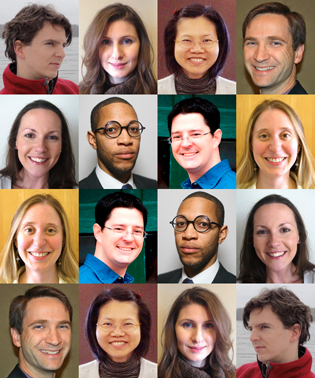
By doing details—temporary assignments in offices that deal with aspects of science policy, administration, and communications—postdocs who’ve fallen out of love with bench research find their way into new careers that make the most of their scientific expertise.
“We desperately need a scientifically literate society,” said Sharon Milgram, director of the Office of Intramural Training and Education (OITE). “That requires scientists moving into many, many jobs away from the bench. That means public-service campaigns, people getting vaccinated, politicians making good decisions, inquiry-based decision making based on data. We need people who can communicate science to nonscientists.”
NIH is prepared to help postdocs explore non-bench careers with a mechanism called a detail. A detail is “when a student or a postdoc goes to a different work environment to gain experience, typically in a job unrelated to bench science,” Milgram explained. “It really is an internship to get your foot in the door, to gain insight, to gain experience, and to build a network.”
Detail assignments can take place within any government agency—or even outside of government—and can include science administration, science policy, science writing, technology transfer, and animal use. At NIH, details can be part-time or full-time and can range from doing a “sabbatical” in another lab to learn a new technique, to going on patient rounds in the Clinical Center, to working in an office where scientific knowledge can be integrated with new skills. Arrangements can be informal with only verbal agreements or very formal with a memorandum of understanding that involves the postdoc’s PI and institute as well as the hosting office. Specifics about the detail, such as the hours and the length, are arranged among the PI, detail host, and the trainee. Usually the PI’s lab continues to pay the salary during the detail.
Not everyone knows that NIH policy has a specific reference to details: “A rotation in a science policy office, generally only one rotation of three months or less, is permitted when such activity can be justified as an integral part of the NIH research experience” (NIH Policy Manual’s chapters on the Intramural Research Training Award, http://oma.od.nih.gov/manualchapters/person/2300-320-7/2300-320-7.pdf) and the Visiting Fellow Program (http://oma.od.nih.gov/manualchapters/person/2300-320-3).
Still a detail is “not a right, not an entitlement,” pointed out Lori Conlan, director of Postdoctoral Services and Career Services in OITE. It’s “something you carve out to build the skill sets that you need.”
Finding the right detail can take time. The OITE posts some opportunities. Most are found, however, through connections that trainees make by networking and conducting informational interviews with people in the fields of interest. Once you’ve found a potential detail, you need to talk to your PI about it.
“Be direct,” advised NCI PI Stan Lipkowitz, who allowed one of his postdocs to do a detail. “Go to the PI and say, ‘I would like to do a detail in XYZ because it will be beneficial to my career development.’ [The postdoc] also should be prepared to address specifics such as how much time and for how long, how their lab work will continue to move forward, and why this is important to [them].”
“There’s an aspect of mentoring and career support and advocacy for people’s career development that is essential as a base to allow the details to take place,” said Deputy Director for Intramural Research Michael Gottesman.
Details are short—usually only a few months out of several years of productive research—compared with the overall time that a trainee spends as a postdoc, Lipkowitz pointed out. And the labs don’t lose out completely. Postdocs doing part-time details continue working in the lab, too.
Still, PIs may be reluctant to give permission. Postdocs were “hired” to do work in the lab, and participating in a detail takes time away from the research. This concern is underscored by NIH’s flat budgets, the increasing costs of conducting biomedical research, and the potential budget cuts that lie ahead.
There are resources to help trainees, however. It helps to “have an ally who can help encourage the PI on your behalf,” advised a former postdoc who struggled to convince her PI to give her permission to do a detail. These allies can be colleagues, IC training officers, and the folks at OITE.
Institute training officers can remind the PIs and lab chiefs about the importance of providing postdocs with career-exploration opportunities, said NEI training director Sarah Sohraby. OITE can also help prepare trainees to talk to their PIs and can provide advice for handling difficult negotiations. In the end, however, it’s up to the PI whether to allow the detail.
If doing a detail isn’t possible, then the trainee may be able to participate in what Gottesman calls “intellectual details.” These include activities outside the normal lab hours that do not require working in a separate office, such as being a volunteer writer for the NIH Catalyst.
“There are a lot of reasons why [doing a detail] is a good idea,” said Gottesman. “It has a lot to do with training someone to become prepared for whatever life will offer them.”
Following the “Advice to Would-Be Detailees” are edited interviews with six NIH postdocs (or former postdocs) who have done details.
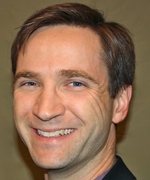
Ben Porter, a postdoctoral fellow at NINDS, is on detail to the Office of Extramural Research in the Office of the Director, NIH. To read his article on the Klebsiella mystery, which appeared in the November-December 2012 issue of the NIH Catalyst, visit https://irp.nih.gov/catalyst/v20i6/intramural-detectives.
For more information on details, contact oite (https:www.training.nih.gov/home) or your institute's training office.
ADVICE TO WOULD-BE DETAILEES
As a postdoctoral fellow at NIH in the Washington, D.C., area, you are in a unique position to arrange a high-exposure detail and experience a wide range of work behind the scenes: program, policy, writing, advocacy, budget, and more. Detailing in an office will allow you to truly see whether you like work away from the bench, and you’ll gain invaluable perspective and experience that will likely be key in successfully taking the next step in your career.
- Look for opportunities posted by OITE, network, and do informational interviews.
- Conduct informational interviews to narrow your career path; you can ask whether an office accepts details to create a list of potentials.
- Consider doing a detail beyond NIH such as at the National Academies, Federation of American Societies for Experimental Biology, Research!America, Congressional committees, and more.
- Choosing the right office for a detail is important. As you do informational interviews, you can shop around and talk to others about their experiences.
- Doing a detail in an office that is committed to mentoring you is far more important than landing in a high-profile office.
- Don’t worry if you feel you are going beyond your expertise—you are doing the detail to gain new skills and experiences.
- An understaffed and very busy office can provide many opportunities, but can also come with pressure. The office where I detailed was one of these, but due to a great mentor and colleagues, it was a rich and fantastic experience.
- If possible, the detail should be in an office willing to give you a “real” position and allow you to do real work. Try to avoid arrangements that will only have you shadowing your boss at meetings.
- Make sure the detail is long enough to be beneficial to both you and the host. It should provide you with the necessary experience to prepare you to enter that field.
- In some cases, the detail works best if it’s full-time up to three months; in other cases, a part-time assignment may be appropriate and can be for one or two days a week for six months.
- Keep in mind that the detail office must invest time in you and you will have to learn the ropes before you have an impact and gain the experience you are looking for.
- Once you have started the detail, communicate clearly what your expectations are and know what your supervisor expects of you.
- Writing for a variety of audiences is one of the most important skills in many science office settings. You’ll be challenged, and you’ll get better.
- When asking permission to do a detail, be direct with your PI and explain that you would like to do a detail because it would be beneficial to your career development. Be prepared to address specifics such as how long the detail would be, why it’s important to you, and how your lab work will continue to move forward.
- If it’s difficult to convince your PI to let you do a detail, contact your institute’s training office and OITE for help.
- The timing is important. Asking a PI to go on a detail two months after joining the lab is probably not a good idea. A trainee should also be sensitive to other things going on in the lab. For instance, avoid approaching the PI right before a Board of Scientific Counselors review or when a paper is two-thirds finished.
- If it’s not possible to do a detail, you can gain writing and communications skills by volunteering to write for the NIH Catalyst, the NIH Record, or other publications.

Kristofor Langlais, a former postdoc in NICHD who did a three-month detail as an international health analyst at the office of Global Affairs IN the Department of Health and Human Services, is now a health-science policy analyst in the Office of Biotechnology Activities, Office of the Director. His previous articles for the NIH Catalyst include one on malaria research (March-April 2011) and on the dbGaP database (May-June 2012).
Meet the Detailees
ANGEL DAVEY, PH.D.
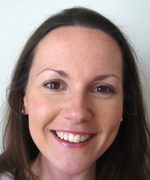
Came to NIH: February 2009
Lab: Postdoctoral fellow, Laboratory of Immunogenetics, Lymphocyte Activation Section, NIAID
Details:
Current and past positions: Science Officer (grants manager), Congressionally Directed Medical Research Programs, Department of Defense (February 2013-present); Technology Development Associate, Immunology and Emerging Infections Branch, NIAID (September 2012–February 2013)
How did you first hear about details?
I first heard about details while attending training workshops hosted by OITE. At the time, I was working closely with NIAID’s Office of Technology Development to develop a material transfer agreement (MTA) to bring reagents to the lab. After the MTA agreement had been finalized, I met with my contact person to talk about her position and what a normal day in a technology-transfer office involves. Several months later, she mentioned that a detail position had opened up and encouraged me to apply.
Why did you decide to do a detail?
I wanted practical hands-on experience in tech transfer. After taking a course in tech transfer, I felt that I would be more marketable if I had actual experience. I pursued a second detail that was advertised—and had a competitive application process—in the Office of Extramural Research. I wanted to learn more about grants administration, policies surrounding peer review, and the range of scientific administration positions.
Describe your details.
How did you approach your PI about doing a detail?
My PI was open to providing training opportunities outside the lab. When I started working there, I was honest with her about my interests and plans, so she was not surprised when I asked about doing a detail.
Is there anything you would have done differently?
What were the best and worst parts of the experiences?
Was there anything surprising or unexpected?
There is a significantly different dynamic being an administrator in an office compared with being a researcher in a lab. Navigating office dynamics and working with people on many different levels was challenging and new.
How were the details beneficial to your career?
Tech Transfer: This detail gave me great practical experience in tech transfer and led to my fellowship position in NIAID’s Office of Technology Development.
Extramural: I gained an in-depth understanding of program management, which is transferable knowledge that will be useful in many contexts.
Would you recommend doing a detail?
Definitely. It is a great way to gain practical experience and can sometimes lead to future employment. I would also recommend making your PI aware of your career goals in order to make a plan to achieve them.
What’s next for you?
I am pursuing a career in science administration where I can focus on the big picture of science research. I enjoy working with people in committees and groups and prefer that to working in isolation on a narrow research question.
- Office of Technology Development, NIAID (four hours/week for six months, Nov 2010–April 2011)
- Office of Extramural Research, Office of the Director (12 hours/week for three months, June 2012–August 2012)
- Technology Development: I reviewed various types of agreements and made changes according to our guidelines. I edited for problematic language, tried to incorporate required stock text, and discussed my changes with my supervisor. I also attended many meetings and gained insight into how the office works internally and within the context of the entire NIH. In addition, I attended the Technology Transfer University training workshop available to technology-transfer associates in any of the NIH institutes.
- Office of Extramural Research: I trained in the development, oversight and improvement of NIH peer-review policies and their impact on NIH funding; evaluated how NIH research training grants promote diversity at various career levels; used an electronic grants database to retrieve and analyze scientific program data; and prepared spreadsheets, charts, reports, and briefing slides to advise NIH leadership
- Tech Transfer: I would have devoted more time each week to the detail experience (I was only spending four hours a week in the office). I could have become more independent in my review of agreements and have had more time to talk with my mentor to learn about the process.
- Office of Extramural Research: I would have enjoyed having my own project instead of pitching in on various projects as needed.
- Tech Transfer: The best part was being able to attend office meetings and participating in the Tech Transfer University. The worst part was that the detail experience was new in that office, and the kinks were still being worked out.
- Extramural Research: The best part was attending departmental and NIH meetings as well as meeting with others in the extramural research group. The worst part was working on what was sometimes tedious data analysis.
LESLEY EARL, PH.D.
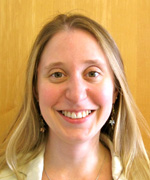
Came to NIH: 2010
Lab: Developmental Glycobiology Unit, NIDCR
Detail: Writer for NIH Research Matters and NIH News in Health, in the Office of Communications and Public Liaison (full time, December 2011–March 2012)
Current position: Postdoctoral fellow, Biophysics Section, Laboratory of Cell Biology, NCI; doing writing and scientific communications (March 2012–present)
How did you first hear about details?
I was at an Association for Women in Science event at NIH where Sharon Milgram (director of OITE) was talking about details. At the time, I was interested in being a science writer and asked her how to go about getting writing experience. She suggested I look into doing a detail.
Why did you decide to do a detail?
I had been lying to myself after graduate school when I thought that I wanted to do a postdoc. My PI and I realized pretty quickly that a postdoc position in a lab was not what I wanted. She knew I was going to need some additional training to go in another direction. We both decided the best way for me to gain the necessary experience to move into a different arena was to do a detail.
Describe your detail.
I wrote for NIH Research Matters and NIH News in Health. Every year they put together a year-end synopsis of the best stories from Research Matters. I read every single article that had been written over the previous year, and that gave me a really good handle on their style and format. I became part of the team writing for both publications. I would write an article a week for NIH Research Matters and an article every other week for NIH News in Health. It was a team effort where everyone was writing different pieces.
How did you find your detail?
I did a lot of networking and talked to lots of people. One person I talked to was John Burklow (director of the NIH Office of Communications and Public Liaison), who gave me all sorts of information on different places to do science writing or writing in general and recommended I contact Harrison Wein, the editor of NIH Research Matters and NIH News in Health. I sent him a couple of pieces I had written for OITE and asked about doing a detail. So, a lot of networking was involved and a little bit of name-dropping here and there. It helps if you know somebody who knows somebody.
How did you approach your PI about doing a detail?
Basically I suggested it as a way of getting additional training. It took a little bit for her to come around to the idea. When I didn’t have a job lined up toward the end of my fellowship, she was very supportive and said let’s get this started so I could gain some experience. The biggest challenge in setting up the detail was the paperwork. Every detail is different; some need to be officially approved and require a lot of signatures.
Is there anything you would have done differently?
No, I think my detail worked great for me and I loved being full time. Having two sets of responsibilities such as lab work and writing would have been complicated. My detail showed me what it felt like to have my own office and work with writers all the time. It was really great to be immersed that way. The only thing I could have wished for would be that it was longer.
Was there anything surprising or unexpected?
I was really struggling in the lab. I had done fine in graduate school, but doing a postdoc didn’t suit me. I had gotten used to constantly banging my head against the wall and being unhappy all the time. Writing came easily. Being in a place where I loved what I was doing was shocking.
How was the detail beneficial to your career?
I think it was immensely beneficial because while the job that I have now isn’t like writing for NIH Research Matters or NIH News in Health, I would say that 75 percent of what I do is write. My detail prepared me for what I’m doing now: I learned how to interview people, delve into a variety of topics, and write for the public. Harrison Wein made sure that I wrote about as many different topics of science as possible, including subjects that were unfamiliar to me. I didn’t do anything that didn’t teach me something important.
Would you recommend that others try doing a detail? Any advice?
If somebody wants to get away from the bench and needs to gain skills, then I would absolutely recommend doing a detail. You get hands-on experience, get a feeling for the culture of doing something else, and meet the people who are doing it. You get immersed and discover whether that is what you want to do. My strongest advice is to approach your PI before you contact someone about setting up a detail because your PI may need some bringing around to the idea. Details are about training you, and that’s part of what a postdoc is about.
Do you think you’ll return to the bench?
No, I am happy being away from doing bench science. One of the things that I like about my current job is that I get to see the real data as soon as they come out and talk to people about their science. I get to use the information and my experience at the bench. I’m only a couple of feet away, and that’s where I like to be.
Anything you’d like to add?
My detail didn’t turn into a job (many people do details that turn into permanent positions), but it helped me develop the skills I needed to land the job I have now. Officially I am still a postdoctoral fellow but I mostly do science writing, maintain and update our lab’s various Web sites, and also help write publications and review articles with the group. Many of the skills I use now I either learned or improved on in my detail; it really was a great experience.
HELEN HUANG, PH.D.

Came to NIH: 2009
Lab: Molecular Dysmorphology Section, NICHD
Details:
- Office of Postdoctoral Services, Office of Intramural Training and Education (one day/week, August 2010–January 2011)
- Scientific Review Branch, NICHD (five days/week, January–June 2011)
Current position: Scientific Review Specialist, Scientific Review Branch, NICHD (July 2011–June 2012 as contractor; June 2012–present as employee)
How did you first hear about details?
From Lori Conlan at the Office of Postdoctoral Services at the OITE.
Why did you decide to do details?
I wanted to explore the possibility of career paths away from the bench.
Describe your details.
OITE: I worked with Lori Conlan to develop a series of career-track seminars. I searched for information regarding careers in regulatory affairs and in technology transfer and then interviewed professionals in those two fields in the government, nonprofit organizations, and private sectors. Then I analyzed and put together interview results and developed presentation documents for the seminars. I thought of it as my own project and enjoyed it a lot.
Scientific Review Branch, NICHD: I worked with the director and a scientific review officer on everything relevant to the initial peer-review meetings that are part of the grant-application process. I was (and still am) the director’s “intern,” and they both have trained me, step by step. During that detail, it dawned on me that I had finally found my niche. There was no specific project assigned to me—I participated and assisted in peer-review meetings whenever I could.
How did you find your details?
I found my first detail in OITE when I contacted Lori Conlan. I talked to others in that office, including OITE Director Sharon Milgram. She suggested I try a detail at the NIH before making a decision. It happened that Lori Conlan could use some help in developing a career-track seminar series, so I asked to do a detail at the OITE. Near the end of my first detail, I was referred to Yvonne Maddox, deputy director of NICHD. She kindly sat down with me to discuss my strengths and weaknesses and different options in science administration. More importantly, she suggested some people to speak to, one of whom was Sherry Dupere, the director of NICHD’s Scientific Review Branch. She agreed to let me try a detail full-time.
How did you approach your PI about doing a detail?
My then-PI was very supportive.
Is there anything you would have done differently?
I would start thinking about different career paths earlier, talk to more people, and even do more details if at all possible.
What were the best and worst parts of the experience?
I stepped out of my comfort zone and found what I can contribute to and enjoy doing.
Was there anything surprising or unexpected?
I did not know I could do something outside of the lab or something I had no experience in. Most importantly, I did not know there are so many people out there who would be willing to help me find my place. Now I feel as if it is time to help others as much as I can for as long as I can.
How were the details beneficial to your career?
My answer would be similar to the one to the previous question. In addition, I’m learning a lot of things now that are important to my career and my life. I am grateful that I’ve got the chance to learn it and I will keep learning.
Would you recommend doing a detail?
I encourage those who want to try to give details a shot at least once. Some people may like it; some not. However, it never hurts to try.
Do you think you’ll return to the bench?
I want to stay in the extramural program. I find the work satisfying, and I can make the best use of my abilities here.
Anything you’d like to add?
I am grateful for all those who helped me find an alternative career path in science administration. I am more than willing to help others who would like to try a non-bench career.
SARAH RHODES, PH.D.
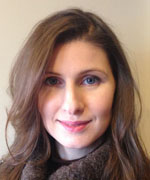
Came to NIH: 2007
Lab: Laboratory of Neuropsychology, NIMH
Detail: Policy analyst, Office of Autism Research Coordination, NIMH (16–20 hours/week in 2009-2010; four days/week in 2012)
Current position: Policy analyst (contractor), Office of Autism Research Coordination, NIMH (2012–present)
How did you first hear about details?
I was at my first science-policy career symposium in 2009, and Paul Scott (NINDS, director of science policy) spoke about his “eureka” moment when he was a researcher doing experiments one night and he realized he wanted to do something else with his life. When he went on to talk about his job now, that was when I had my own “eureka” moment and realized that I wanted his job. I spoke to him afterward, and Paul suggested that I do a detail. He explained how details worked and whom I could get in touch with to do some informational interviewing.
Why did you decide to do a detail?
First, I wanted to make certain that policy was what I wanted to do and the only way to really do that was to try it on for size. Second, to get a job in policy I needed relevant experience, and a detail is a really great way to get these skills. We are really lucky at NIH that we can do details. It is something you wouldn’t have the opportunity to easily do elsewhere.
Describe your detail.
The Office of Autism Research Coordination (OARC) is a small office with a really broad set of policy-related functions, so I was lucky during my two details that I had the opportunity to get involved in a huge range of tasks. I’ve been involved in activities such as preparing, coding, and analyzing autism research-funding data and using these data to write our Annual Portfolio Analysis Report that describes the funding landscape for autism research; planning meetings and workshops for the Interagency Autism Coordinating Committee (IACC), the federal advisory committee that our office manages; assisting the IACC during the process of updating the Strategic Plan for Autism Spectrum Disorders Research; preparing materials for briefings and testimonies by NIH and the Department of Health and Human Services leadership; and preparing responses for information requests and Congressional inquiries to our office.
How did you find your detail?
Through networking, informational interviewing, and attending career panels. At career panels, don’t be passive! Ask questions and speak to the panelists afterward. In my case, by networking with the speakers after the career panel, I connected with other people for informational interviews; one of those interviews led to an offer for a detail spot at OARC.
How did you approach your PI about doing a detail?
It was difficult, at first. I was lucky my PI (Elizabeth Murray) was a very approachable person, but for her, doing a detail was a bit of an anomaly. She had devoted her life to research and it took her a while to understand why I didn’t want to do research. But I was honest and said that policy is what I really wanted to do. Ultimately she was very supportive, but she did set limits: The detail couldn’t be full-time because for my experiments to work I had to run them daily, so I worked four mornings a week and then worked later in the lab if I had things to finish up. Time management was really important.
Is there anything you would have done differently?
Not really, although I wish there had been more time in the week. It is a real balancing act keeping everyone happy.
What were the best and worst parts of the experience?
The best part was sinking my teeth into what policy work is about and making connections in both OARC and other policy-related offices, which allowed me to expand my network. The worst part of the detail was feeling as if I was working two jobs. It can be very tiring, but it is worth it if you know this is what you want to do.
Was there anything surprising or unexpected?
I was surprised and impressed by the variety of the work and that I was actually put to work and not just humored. I was really doing the job!
How was the detail beneficial for your career?
The most beneficial part was being given the opportunity to prove myself and build connections, which in my case resulted in a job. In this town, you are more likely to get jobs through networking and personal connections than by applying to an ad. It is important not to be just another name on a piece of paper. My boss (Susan Daniels, the acting director of OARC) has been incredibly supportive. During my detail in 2009 she took me under her wing and continued to mentor me when my detail ended and I went back to the lab. We stayed in touch, so when the timing was right for me to leave the lab and there was an opportunity in her office, I moved over as a detailee. I later became a full-time member of the OARC staff.
Would you recommend doing a detail? Any other advice?
I would absolutely recommend doing a detail if you are even considering a career in science policy. You will find out quickly whether you enjoy this type of work, and this type of experience is necessary to get a job in policy. My advice to postdocs interested in a detail is to network. Don’t feel bad about e-mailing people to request an informational interview. At the very least you’ll get some useful information and advice and expand your connections. Don’t expect that every conversation will lead to a position, but your enthusiasm will show through and hopefully make an impression. Also, be honest with your boss about your career goals, while demonstrating your commitment to your lab work.
Would you like to go back to the bench?
Doing a detail confirmed that policy was what I wanted to do. I did go back to the bench, temporarily, to finish my projects.
PHILIP RYAN, PH.D.
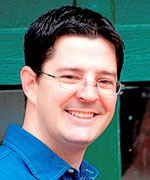
Came to NIH: In 2003 as graduate student; in 2008 became a postdoc
Lab: Laboratory of Cellular and Molecular Biology, NCI
Detail: Intern, OITE (two days/week, November 2010–August 2011)
Positions after postdoc: Director of Student Services at NIH Graduate Partnerships Program, OITE (June 2012–present); scientific program analyst, OITE (September 2011–June 2012)
How did you first hear about details?
During my graduate work I was really involved with the graduate student council here, and OITE didn’t really exist at the time. We did a lot of our own career development and career advancement kind of work on the council. Rumors started to filter in that students would go and spend some time away from the lab working in other fields, and it was called a “detail.” And so after looking for jobs for a long time, I went to Sharon Milgram, who became the director of OITE in 2007, and said, “I want to do what you guys do, but I can’t get a job because I have no experience.” She said, “Well, you can do a detail.”
Why did you decide to do a detail?
By the time I finished my doctoral work, I realized that I didn’t want to stay in research. I had stayed in one lab all the way through my graduate work, so doing a postdoc with somebody else didn’t really seem to make a whole lot of sense. I actually turned down a great postdoc position out in California, which was where my wife and I have families. But I just didn’t want to do research, the project didn’t excite me, and the whole idea of being in the lab totally turned me off. So my PI here suggested I stay and that I could pursue other careers and get training to be able to look elsewhere. I stayed with him another three years before I could actually find a job. It was one of those catch-22s where any of the jobs I really wanted I needed administrative experience for, and yet any job that I could get administrative experience in they told me that I was overqualified. So I wanted to do the work in OITE, and the best way to get experience doing the work was to donate my time.
Describe your detail.
I worked on two projects. One was to create a series of Web tutorials for young scientists on how to keep a lab notebook; some of the basic lab maths, which turned into two Web tutorials; and attending your first scientific conference or meeting. The other project was to manage the intramural AIDS Research Fellowship, which is a fellowship open to graduate students and postdocs here at the NIH. They can write a research-proposal and career-development plan and, if approved, they then get their stipend and health insurance covered by this fellowship. So I managed that for 2011 for the detail, and I’ve kept it ever since.
How did you find your detail?
Before I did my detail, I did informational interviews with most everybody in OITE and with someone in NHGRI who does a lot of their K-12 outreach materials and science-education outreach.
How did you approach your PI about doing a detail?
I had a unique relationship with my PI, in which he was not just a PI but a mentor and a personal friend. We had a great relationship. When I sat down and told him that I was done with academic research, he gave me the puppy-dog eyes, and then he picked himself up and said, “All right, what do you want to do, and how do we get you there?” He has been a champion for me since the very beginning. It’s a lot of fun now in my current position, because he’s a program director for the GW GPP, so I get to work with him all the time. It’s fantastic. He was willing to do whatever it took to make sure that I was happy and successful in my career, so it was really easy to approach him.
Is there anything that you would have done differently?
No. I mean I got a job out of it. I think I did everything just right. I think for me the biggest thing was to come in very humble, to understand that I was coming in knowing nothing, and that everybody had something to teach me. It worked to my advantage that I was a sponge. OITE is a fantastic place to work and the people are great. I have a fantastic mentor, very structured, which is good for my type of personality. I knew exactly what was expected of me. It really couldn’t have worked out better.
What were the best and worst parts of the experience?
The thing I liked best about the detail, and I still like best about my job, is it’s never the same thing every day. Which was kind of what was great about research a lot of times; you follow the data. The people that I worked with were so willing to give. If you’re hungry to learn, they want to teach you. The worst part was only being able to do it for two days a week and still having to do the lab work. There were really mundane parts of it, but I’ve been in the lab, so that’s not a shock, right. Mundane and repetitive is kind of what lab work is, so those days didn’t really bother me at all. My wife will tell you that when I started the detail, my attitude changed completely.
Was there anything surprising or unexpected?
I was surprised by how interconnected everything at OITE is. There are a lot of different offices—postdoctoral services, postbaccalaureate services, the Graduate Partnerships Program, the NIH Academy, the undergraduate scholars program—but everybody is involved in everybody else’s programs. When somebody has an event, everybody is there to support it. I was surprised when, out of the blue, I was asked to review applicants for a program because the person knew I needed the experience. I was caught off guard by working with so many different offices on so many different types of projects, and that everybody was working towards the same goal.
How was the detail beneficial for your career?
I got a job doing exactly what I want to do. It was because of the detail that I was able to prove that I could do the job and prove that I could do it well. When the position opened, I had already proved I could do the job of Director of Student Services and was first in line to fill it.
Would you recommend doing a detail? Any other advice?
My advice would be, the worst thing they can say is no. You go and ask and they say no and you go back to working in the lab. But I would definitely recommend it, if you’re looking to do something different. Get out of the lab, especially if you’re looking to stay in this general geographical area, there are so many Ph.D.s here that it’s ridiculous. It’s so hard to find a job in this area that’s outside of the lab, because there’s so many of us here trying to get outside of the lab. So volunteering your time to get experience that you can put on your résumé is your best bet. Even more than the experience, you gain contacts, you gain networks. By the time I had done a month of a detail at OITE, I had people in the office contacting people they knew to see whether they had job openings. And then they would connect me with other people. The network that you form by doing a detail, if you’re going to do the job well, is invaluable, even more than the experience.
Is there anything that you’d like to add?
I was luckier than others in the fact that my detail rolled right into a full-time position. I know a lot of people who have done details and some haven’t worked out real well. I think that even if you do a detail and you hate it, then you realize it’s a job that you don’t want to do. When I got hired on as the program analyst, I took over the OITE careers blog and writing some of the pieces. One of the things we wrote about was what luck really looks like. Everyone we talked to would say, “Oh, I got kind of lucky, I was working on this committee, and then I happened to interact with this person who knew someone who was having a job opening,” or “I got lucky. I volunteered to write this job article and somebody offered me a job.” If you’re stuck in the lab, you’re not going to meet the people who might hire you. Luck is really your being in the right place at the right time because you put yourself there.
TYRONE SPADY, PH.D.
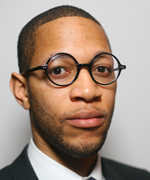
Came to NIH: In 2006
Lab: Cancer Genetics Branch, NHGRI
Detail: Office of Public Affairs, Federation of American Societies for Experimental Biology (FASEB), (12 hours/week, March–June 2009)
Current and previous positions at FASEB: Legislative Affairs Officer, Office of Public Affairs (2012–present); Senior Science Policy Analyst, (2011–2012); Science Policy Analyst (2009-2011)
How did you first hear about details?
I learned about details from the staff of the NIH Office of Science Policy.
Why did you decide to do a detail?
I was interested in science policy and saw a detail as a good way to get experience and to test the waters.
Describe your detail.
I did my detail at the Federation of American Societies for Experimental Biology (FASEB). It consisted of working in the Office of Public Affairs for 12 hours/week for three months. FASEB had just launched an NIH advocacy clearinghouse. Because I was passionate about basic nonmedical research, I proposed creating an NSF advocacy clearinghouse as my project.
How did you find your detail?
I was e-introduced by NIH Director Francis Collins to FASEB’s Director of Public Affairs Howard Garrison. I then arranged an informational interview and asked Dr. Garrison whether he knew of opportunities that might allow me to gain policy experience. (I was intentionally indirect in my inquiry so as not to put him on the spot.)
How did you approach your PI about doing a detail?
I waited until I had worked out the general terms of my detail before approaching my PI. I laid the groundwork well in advance by stating my intention to gain science-policy experience. I also spoke with the leadership of my institute (in general terms) to establish the feasibility of doing a detail with a nongovernment or advocacy organization. My PI hadn’t had experience with details, so it was tremendously useful being able to go into the dialogue only needing a “yes” from her.
Is there anything you would have done differently?
No.
What were the best and worst parts of the experience?
The best part of the experience was knowing that I was making progress toward transitioning into policy. The most challenging aspect of doing the detail was committing to leaving the bench.
Was there anything surprising or unexpected about the detail?
I hadn’t anticipated how much more formalized, hierarchical, and rigidly stratified working in an office could be.
How was the detail beneficial to your career?
The experience was 100 percent beneficial for my career. It led directly to my first position as FASEB’s Science Policy Analyst.
Would you recommend doing a detail? Any other advice?
I absolutely recommend details. They are a great way to gain the experience one needs to obtain one’s first position in a new field.
Would you like to go back to the bench?
I will not return to the bench. I’ve found policy and legislative affairs to be a much better fit for me. I get to think about big-picture issues, meet lots of interesting people, and translate compelling stories from the bench to nonscientists. As such, it’s the best of both worlds.
Anything you’d like to add?
Network! Don’t hesitate to reach out to anyone. You never know where you’ll find your first break.
This page was last updated on Friday, April 29, 2022
